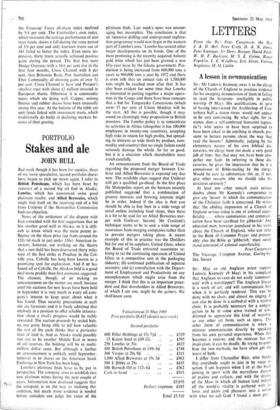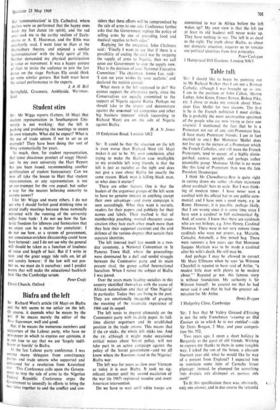Sir: May an old Anglican priest support Ludovic Kennedy (9
May) in his complaint that Anglican services do not easily 'communi- cate' with a worshipper? The Anglican liturgy is a work of art; and will communicate best when it is perfectly rendered. This can be done with no choir, and almost no singing. It can also be done in a cathedral with a trained choir. It is probably necessary for a congre- gation to be in some sense trained or con- ditioned to appreciate this kind of worship. as any other art form, such as opera. The other form of communication is when a minister communicates directly by speaking from his own personal experience. When this becomes a routine, and the minister has no inspiration, it can be deadly. By trying to com- bine the two methods, we have often got the worst of both. I differ from Chancellor Blair, who thinks that everybody ought to join in by voice or action. I am happiest when I sit at the back joining in spirit with the marvellous diction of psalms and collects, and with the drama of the Mass in which all human (and indeed all the world's) vitality is gathered with it' loves and pains and pleasures into a union with what we call God. I found a most per- feet 'communication' in Ely Cathedral, where psalms were so performed that the happy ones made my feet dance (in spirit), and the sad ones took me to the earthy realism of Eccle- siaites or A. E. Housman, and the Bible was excellently read. I went later to Hair at the Shaftesbury theatre, and enjoyed a similar 'communication' with the holy spirit of life. Neither demanded my physical participation in voice or movement. It was a happy gesture of Hair to invite the audience to join the last dance on the stage. Perhaps Ely could think up some similar gesture. But both must leave the actual performance to the experts,







































 Previous page
Previous page